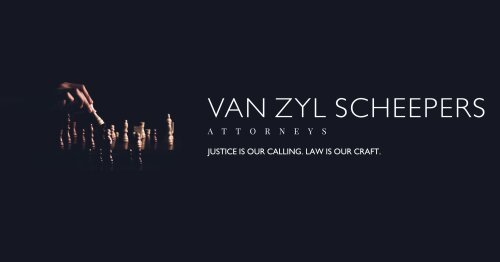Best Divorce & Separation Lawyers in Stellenbosch
Share your needs with us, get contacted by law firms.
Free. Takes 2 min.
Free Guide to Hiring a Family Lawyer
List of the best lawyers in Stellenbosch, South Africa
South Africa Divorce & Separation Legal Questions answered by Lawyers
Browse our 1 legal question about Divorce & Separation in South Africa and read the lawyer answers, or ask your own questions for free.
- What can I do to get my divorce settlement
- I got divorced last November, but I haven't received my settlement. It's a story from one to another, so what must I do to get my settlement
-
Lawyer answer by MAH&CO.
Hello, I'm sorry to hear about your situation. If your divorce was finalized last November and you still haven’t received your settlement, it’s important to take legal steps without further delay. In most cases, the court's judgment or settlement agreement...
Read full answer
About Divorce & Separation Law in Stellenbosch, South Africa
Divorce and separation involve the legal dissolution of a marriage by a court or other competent body. In Stellenbosch, South Africa, these matters are governed by national family law, which sets out the procedures and requirements for legally ending a marriage or partnership. Understanding the complexities of these laws is essential for anyone wishing to navigate the process efficiently and fairly. Stellenbosch, as part of the Western Cape, adheres to the national legal framework with some aspects influenced by the region's social and cultural norms.
Why You May Need a Lawyer
There are several scenarios where obtaining legal counsel can be crucial:
- When there are disagreements over the division of assets or debts acquired during the marriage.
- In cases involving child custody and visitation rights, especially if parents cannot agree.
- When there are complexities related to spousal or child support, including the determination of fair amounts and enforcement of agreements.
- If one spouse suspects hidden assets or improper conduct during the marriage that may affect asset division.
- In situations involving domestic abuse, where protection orders may be required as part of the divorce proceedings.
Local Laws Overview
Divorce laws in South Africa are mainly outlined in the Divorce Act of 1979. Key aspects include:
- South Africa recognizes both civil and customary marriages, and both can be legally dissolved through divorce.
- The country has a 'no-fault' divorce system, meaning the courts do not require a reason such as adultery or abandonment to grant a divorce.
- Equitable distribution is practiced, where marital assets are divided fairly though not necessarily equally.
- The best interest of the child is paramount in custody considerations.
- Spousal maintenance is not guaranteed; it must be requested and justified in court, demonstrating dependency on the spouse’s income.
Frequently Asked Questions
How long does it take to get a divorce in Stellenbosch?
The duration varies but uncontested divorces can be finalized within a few months, while contested divorces may take several years, depending on the complexity of issues.
Do I need to prove fault to get a divorce?
No, South Africa has a 'no-fault' divorce system, meaning that proving misconduct by either spouse is not necessary.
How is child custody decided in Stellenbosch?
Custody decisions are based on the best interest of the child, considering factors such as stability, the child’s wishes, and each parent's ability to provide care.
What is the difference between divorce and separation?
Divorce legally ends a marriage, while separation may involve living apart and making separate arrangements but without legal termination of the marriage.
Can a separation agreement be legally enforced?
Yes, if both parties agree, a separation agreement can be drawn up and filed with the court to become legally binding.
Am I entitled to my spouse's pension?
Pensions earned during the marriage are typically considered marital property and subject to division upon divorce.
How is spousal maintenance determined?
Maintenance is based on several factors, including the length of the marriage, each spouse's ability to support themselves, and their respective roles during the marriage.
Can we use the same lawyer for our divorce?
It is possible but generally not advisable, as a lawyer's duty is to represent the client's interests, which can lead to conflicts of interest.
What happens to our joint property?
Joint property is subject to division. The distribution is based on an equitable division approach, as agreed by the parties or ordered by the court.
Is mediation required before going to court?
While mediation is not mandatory, it is highly encouraged as it helps parties reach agreements with less conflict and cost than litigation.
Additional Resources
- The South African Department of Justice and Constitutional Development offers guidance on divorce proceedings.
- Legal Aid South Africa provides legal assistance to those unable to afford a private lawyer, including advice on divorce matters.
- The Family Advocate offices help with disputes regarding the welfare of children, such as custody and maintenance issues.
Next Steps
Should you decide to seek legal assistance, start by consulting with a family law attorney experienced with South African divorce laws. They can provide personalized advice and representation tailored to your individual situation. Additionally, consider attending mediation sessions to resolve disputes amicably. For those with financial constraints, explore free legal resources offered by organizations like Legal Aid South Africa.
Lawzana helps you find the best lawyers and law firms in Stellenbosch through a curated and pre-screened list of qualified legal professionals. Our platform offers rankings and detailed profiles of attorneys and law firms, allowing you to compare based on practice areas, including Divorce & Separation, experience, and client feedback.
Each profile includes a description of the firm's areas of practice, client reviews, team members and partners, year of establishment, spoken languages, office locations, contact information, social media presence, and any published articles or resources. Most firms on our platform speak English and are experienced in both local and international legal matters.
Get a quote from top-rated law firms in Stellenbosch, South Africa — quickly, securely, and without unnecessary hassle.
Disclaimer:
The information provided on this page is for general informational purposes only and does not constitute legal advice. While we strive to ensure the accuracy and relevance of the content, legal information may change over time, and interpretations of the law can vary. You should always consult with a qualified legal professional for advice specific to your situation.
We disclaim all liability for actions taken or not taken based on the content of this page. If you believe any information is incorrect or outdated, please contact us, and we will review and update it where appropriate.











